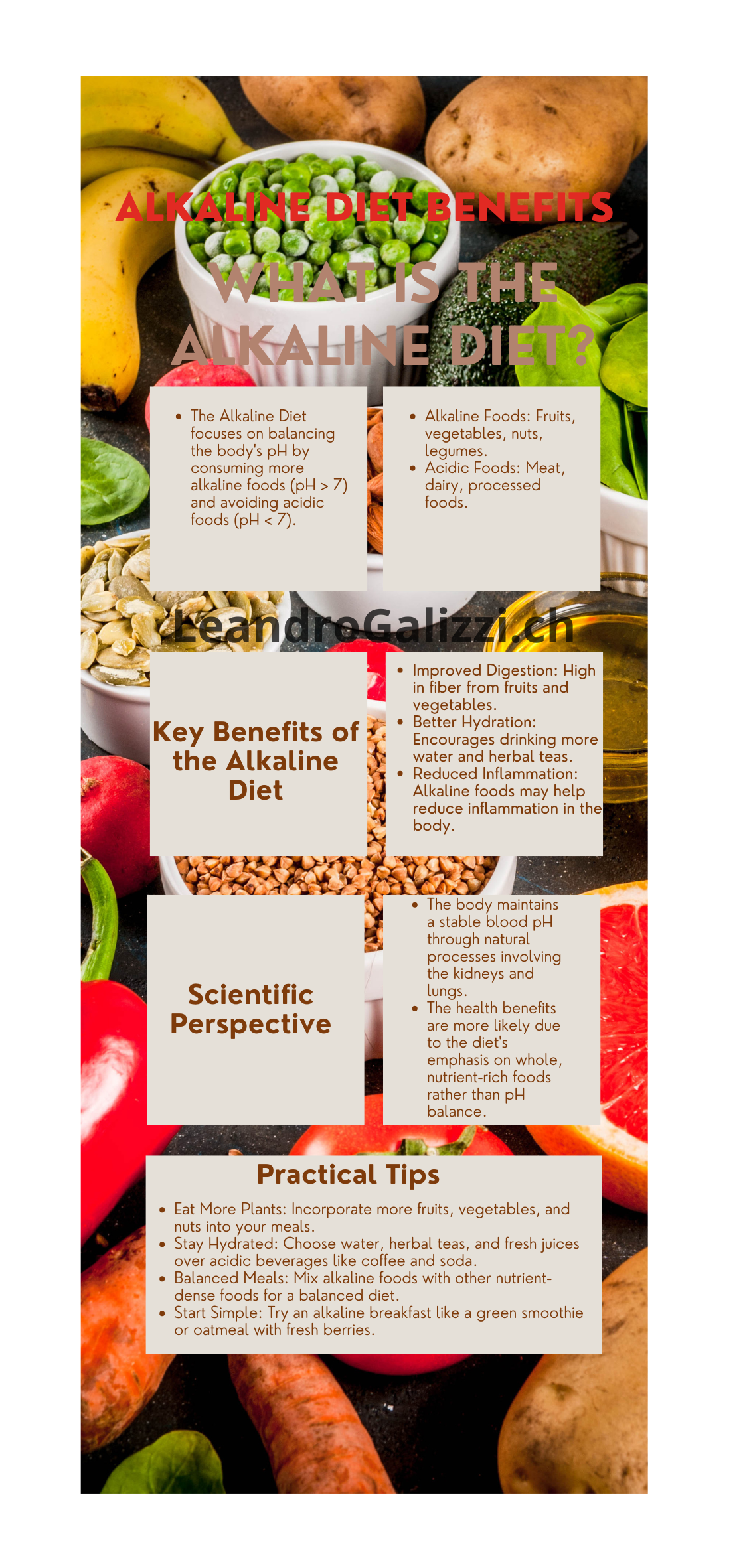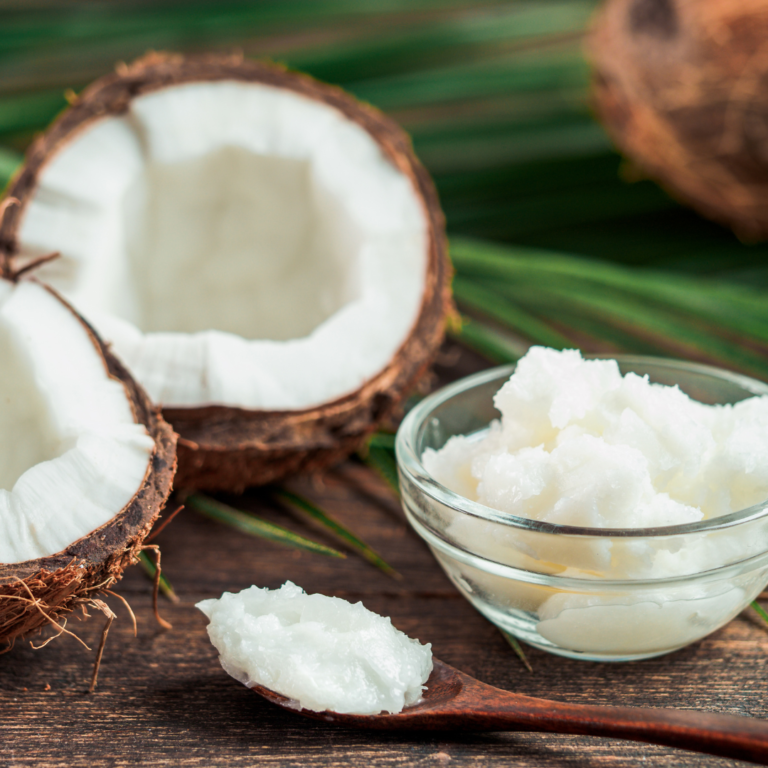Alkaline Diet Benefits: What Science and Experts Say

The Alkaline Diet has garnered significant attention over the years, attracting both enthusiastic followers and skeptical critics. From promises of weight loss and increased energy to claims of disease prevention, the benefits of the Alkaline Diet have become a staple in wellness circles. But how much of this is rooted in science? In this blog post, we’ll delve into what the Alkaline Diet is, examine the health claims associated with it, and compare it to another popular diet—the Paleo diet—to see how they stack up.
Table of Contents
- What is the Alkaline Diet?
- Alkaline Diet vs. Paleo Diet: A Comparative Analysis
- Health Claims of the Alkaline Diet
- Scientific Perspective on the Alkaline Diet
- Benefits of an Alkaline Diet: Fact vs. Fiction
- Practical Tips for Following an Alkaline Diet
- Challenges and Considerations
- Conclusion
What is the Alkaline Diet?
The alkaline diet is based on the idea that the foods we eat can affect the pH balance of our bodies, particularly our blood. The diet encourages the consumption of foods that are considered alkaline—those that supposedly help maintain an ideal pH level in the body—while avoiding foods that are acidic.
The pH scale ranges from 0 to 14, with 7 being neutral. Foods with a pH level below 7 are considered acidic, while those above 7 are considered alkaline. Proponents of the diet believe that eating more alkaline foods (like fruits, vegetables, nuts, and legumes) and avoiding acidic foods (such as meat, dairy, and processed foods) can lead to better health outcomes.
However, it’s important to note that while foods can influence the pH of urine, the human body maintains a tightly regulated pH level in the blood, regardless of dietary choices. This regulation is critical for survival, and the body has robust mechanisms in place to manage pH levels, such as through the kidneys and respiratory system.
Alkaline Diet vs. Paleo Diet: A Comparative Analysis
The Paleo diet, like the alkaline diet, focuses on whole foods, but it is based on the eating patterns of our Paleolithic ancestors. The premise of the Paleo diet is to consume foods that were presumably available to humans before the advent of agriculture—think meats, fish, vegetables, fruits, nuts, and seeds, while excluding grains, legumes, dairy, and processed foods.
When comparing the two diets, several similarities stand out. Both diets emphasize whole, unprocessed foods and the exclusion of processed foods, which can lead to healthier eating habits overall. However, they differ significantly in their approach to macronutrient composition and food restrictions:
- Protein Sources: The Paleo diet encourages a high intake of animal protein, including meats and fish, which are considered acidic under the alkaline diet and thus avoided.
- Dairy and Grains: Both diets exclude dairy and grains, but for different reasons. The alkaline diet avoids them due to their acidic properties, while the Paleo diet excludes them based on the idea that these foods were not part of the early human diet.
- Philosophical Differences: The alkaline diet is driven by the concept of maintaining the body’s pH balance, while the Paleo diet is rooted in evolutionary biology, aiming to replicate the diet of ancient humans.
In terms of health claims, both diets argue for their effectiveness in improving energy levels, aiding weight loss, and reducing the risk of chronic diseases. However, while the Paleo diet has been supported by some studies showing benefits like improved glucose tolerance and reduced cardiovascular risk factors, the alkaline diet’s claims about pH balance and its direct health benefits are not as strongly supported by scientific evidence.
Health Claims of the Alkaline Diet
Proponents of the alkaline diet make several health claims, ranging from weight loss and increased energy to the prevention of diseases like cancer. They argue that an acidic diet leads to an acidic environment in the body, which can cause inflammation, lower immunity, and lead to chronic diseases.
However, scientific evidence supporting these claims is limited. The body’s pH level, particularly in the blood, remains stable due to its natural regulatory systems. While it’s true that an alkaline diet encourages the consumption of nutrient-dense, whole foods, the benefits associated with it likely stem from these healthy eating habits rather than any impact on pH levels.
In the next sections, we’ll explore the scientific perspective on the alkaline diet, dissecting these health claims further and offering practical tips for those interested in following an alkaline diet.
Scientific Perspective on the Alkaline Diet
The alkaline diet’s popularity is largely driven by its promises of improved health, but what does science have to say about these claims? Let’s start with the basics: the human body maintains a tightly regulated pH level, especially in the blood, which stays within a narrow range of 7.35 to 7.45. This is slightly alkaline and is essential for survival. The idea that food can significantly alter this balance in the blood is not supported by scientific evidence.
When we eat, the body’s metabolic processes manage any excess acid or base through the kidneys, lungs, and other regulatory mechanisms. For instance, the kidneys filter out excess acids through urine, while the lungs expel carbon dioxide, which is a component of the body’s acid balance.
Studies have shown that while the pH of urine can be influenced by diet, this does not reflect the pH of the blood or overall body pH. Therefore, the premise that eating alkaline foods can significantly alter your body’s pH and improve health is considered a myth by many experts. Instead, the benefits of the alkaline diet likely come from its focus on consuming more fruits, vegetables, and whole foods—nutrient-rich options that naturally promote better health.
In fact, many of the benefits attributed to the alkaline diet are shared with other diets that emphasize whole, plant-based foods, such as the Mediterranean diet. These benefits include reduced inflammation, improved heart health, and better digestion. However, these outcomes are linked more to the nutrient content of the foods rather than their pH levels.
Benefits of an Alkaline Diet: Fact vs. Fiction
One of the key selling points of the alkaline diet is its supposed ability to help the body ward off diseases like osteoporosis, cancer, and even chronic kidney disease. But separating fact from fiction is crucial for anyone considering this diet.
Bone Health: The alkaline diet is often promoted as a way to improve bone health by reducing calcium loss. The theory suggests that an acidic diet leads to bone demineralization, but research doesn’t fully support this claim. While some studies have found that diets high in fruits and vegetables (which are alkaline) can benefit bone health, this is likely due to the high levels of nutrients like potassium and magnesium in these foods, rather than their alkalinity.
Cancer Prevention: Another popular claim is that an alkaline diet can prevent or even treat cancer. This idea is based on the notion that cancer cells thrive in acidic environments, and thus, making the body more alkaline could inhibit cancer growth. However, there is no substantial scientific evidence supporting this claim. Cancer treatment is complex, and while diet plays a role in overall health, no specific foods or diets have been proven to alter the body’s pH in a way that affects cancer.
Chronic Disease Management: While the alkaline diet may not directly influence blood pH, it does encourage the consumption of foods that are beneficial for overall health. Diets rich in vegetables, fruits, and whole grains are associated with a lower risk of chronic diseases like heart disease and diabetes. These benefits are more about the nutritional quality of the diet rather than its pH-balancing effects.
Ultimately, the benefits of the alkaline diet are rooted in healthy eating principles that emphasize nutrient-dense, whole foods. The diet’s focus on avoiding processed foods, sugars, and unhealthy fats can certainly lead to better health outcomes, but these are not exclusive to an alkaline diet. Similar benefits can be achieved through other balanced diets without the need to worry about food pH levels.

Practical Tips for Following an Alkaline Diet
If you’re interested in trying the alkaline diet, it’s important to approach it with a balanced mindset. Here are some practical tips to help you get started:
- Focus on Whole Foods: Prioritize eating fresh vegetables, fruits, nuts, seeds, and legumes. These foods are naturally alkaline and offer a variety of essential nutrients.
- Incorporate More Plant-Based Meals: Try to replace meat with plant-based proteins like tofu, beans, and lentils. These options are alkaline and can help you diversify your diet.
- Watch Your Beverage Choices: Opt for water, herbal teas, and freshly made vegetable juices. Avoid sugary drinks, coffee, and alcohol, as they are considered acidic.
- Start Your Day with an Alkaline Breakfast: Consider a smoothie made with spinach, almond milk, and a banana, or oatmeal topped with fresh berries and nuts.
- Experiment with Recipes: Look for alkaline diet recipes online to keep your meals varied and exciting. There are plenty of delicious, simple meals that fit the alkaline guidelines.
- Balance with Other Nutritional Needs: While focusing on alkaline foods, ensure you’re getting enough protein, healthy fats, and other essential nutrients. It’s important to maintain a well-rounded diet.
By integrating these tips into your routine, you can reap the benefits of the alkaline diet without compromising on variety or taste. Remember, it’s not just about following the diet strictly, but about adopting healthier eating habits overall.
Challenges and Considerations
While the alkaline diet offers potential health benefits, it’s not without its challenges. For many, the diet’s restrictive nature can make it difficult to maintain in the long term. Here are some of the key considerations:
- Restrictive Food Choices: The alkaline diet limits or eliminates entire food groups, such as dairy, meat, and grains. This can be challenging for those who enjoy a varied diet or have cultural or personal preferences that include these foods.
- Social and Lifestyle Impact: Following an alkaline diet can make social situations, such as dining out or attending events, more difficult. Many restaurants and social gatherings feature foods that are considered acidic, making it hard to stick to the diet.
- Nutritional Balance: By excluding certain food groups, there’s a risk of missing out on essential nutrients, such as protein, calcium, and vitamin B12, which are commonly found in animal products. Those on an alkaline diet need to be mindful of getting these nutrients from other sources.
- Scientific Skepticism: As discussed earlier, the scientific community remains skeptical about the diet’s claims, particularly regarding its impact on blood pH and its purported ability to prevent serious diseases. This skepticism should be considered when deciding whether to adopt the diet.
For those considering the alkaline diet, it’s important to weigh these challenges against the potential benefits. Consulting with a healthcare provider or a registered dietitian can help ensure that you’re meeting your nutritional needs while following the diet.
Conclusion
The alkaline diet, like many dietary trends, has its share of both advocates and critics. While it encourages the consumption of healthy, whole foods, many of its foundational claims about altering body pH and preventing disease are not supported by strong scientific evidence. The benefits that do arise from the diet are likely due to its emphasis on nutrient-rich, plant-based foods rather than any significant change in the body’s pH balance.
For those who are interested in the diet, it’s important to approach it with a balanced perspective. Focus on the positive aspects, such as eating more fruits and vegetables, while being mindful of the diet’s restrictions and potential nutritional gaps. And, as with any major dietary change, it’s wise to consult with a healthcare professional to ensure it aligns with your personal health needs.
Have you tried the alkaline diet, or are you considering it? Share your experiences with us. Your journey can help others make informed decisions about their own dietary choices.
References:
- Schwalfenberg, G. K. (2012). The Alkaline Diet: Is There Evidence That an Alkaline pH Diet Benefits Health? Journal of Environmental and Public Health.
- Fenton, T. R., & Huang, T. (2011). Systematic Review of the Association between Dietary Acid Load, Alkaline Water and Cancer. British Journal of Cancer.
- Remer, T., & Manz, F. (1995). Potential Renal Acid Load of Foods and Its Influence on Urine pH. Journal of the American Dietetic Association.
- Dawson-Hughes, B., Harris, S. S., & Ceglia, L. (2009). Alkaline Diets Favor Lean Tissue Mass in Older Adults. American Journal of Clinical Nutrition.
- Frassetto, L., Morris, R. C. Jr., & Sebastian, A. (1994). Diet, Evolution and Aging—The Pathophysiologic Effects of the Post-Agricultural Inversion of the Potassium-to-Sodium and Base-to-Chloride Ratios in the Human Diet. American Journal of Clinical Nutrition.






